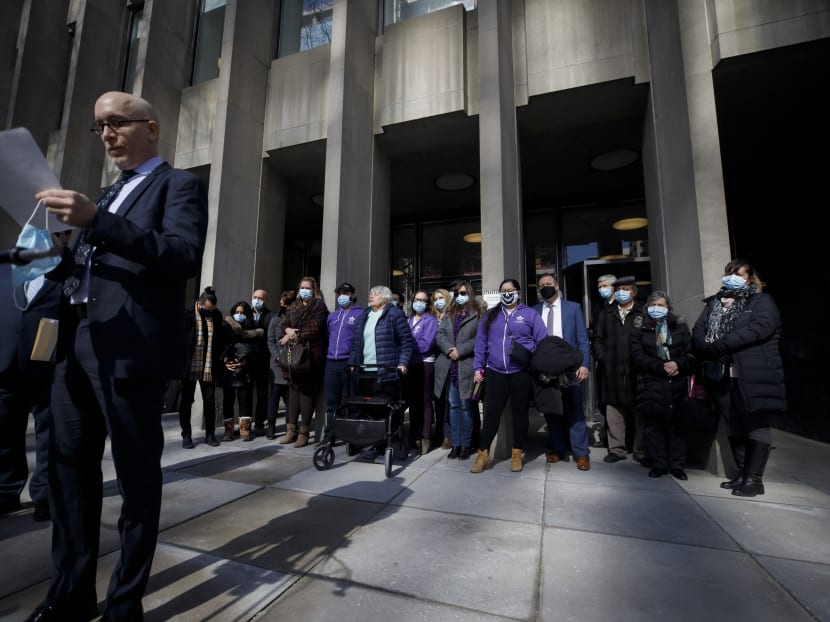Toronto van attacker found guilty of killing 10, injuring 16
TORONTO — A 28-year-old Canadian who plowed a van into pedestrians in a deadly attack three years ago in Toronto was found guilty Wednesday (March 3) of murdering 10 people and trying to kill 16 others.

Victims, as well as family and friends of victims of the 2018 deadly van attack gather outside the Toronto Courthouse in Toronto, Ontario, as crown attorney Joe Callaghan reads a statement to media following the verdict in the trial of accused van attacker Alek Minassian on March 3, 2021.
TORONTO — A 28-year-old Canadian who plowed a van into pedestrians in a deadly attack three years ago in Toronto was found guilty Wednesday (March 3) of murdering 10 people and trying to kill 16 others.
Ontario Superior Court Judge Anne Molloy rejected defense arguments that Alek Minassian was incapable of discerning right from wrong because of his autism spectrum disorder (ASD), calling his crime "horrific."
Minassian faces a minimum of 25 years in prison, but could get consecutive terms for each murder — effectively a life sentence over what is seen as one of Canada's most grisly attacks.
A sentencing hearing will be scheduled later this month.
"His attack on these 26 victims that day was an act of a reasoning mind, notwithstanding its horrific nature and notwithstanding that he has no remorse for it and no empathy for his victims," Ms Molloy said in her ruling.
"He knew it was morally wrong by society's standards," she said. "He chose to commit the crimes anyway."
Ms Molloy ruled that he was "criminally responsible for his actions."
Minassian had admitted to planning and carrying out the April 2018 attack, leaving his state of mind at the time as the only issue considered during his six-week trial.
Psychiatrists and his father testified that he had been diagnosed as a child with a pervasive developmental disorder — now known as ASD.
Minassian's mother has said he suffers from Asperger's syndrome, a form of autism that includes impaired social interactions or communication.
Defence lawyer Boris Bytensky argued that Minassian's ASD left him incapable of making a rational choice when he decided to target bystanders, but Ms Molloy was unswayed.
'RIGHT THING WAS DONE'
Ms Catherine Riddell, who was injured in the attack, said outside the Toronto courthouse that she was "relieved" the trial was over and she could finally sleep well.
"I'm happy that he is going to be in jail for a very long time, and that we don't need to worry about him," she told AFP.
"I'm not in a party mood, because it's not a celebration. Nobody wins in this, but the right thing was done."
Mr Nick D'Amico, whose sister was killed in the attack, told reporters he too can finally breathe more easily after "holding my breath for three years."
Advocacy groups had condemned the use of autism as a defence, expressing concern it would further stigmatise those with the disorder.
"Violent traits have no connection to autism; in fact, people on the autism spectrum are far more likely to be victims as opposed to perpetrators of violence," the Ontario Autism Coalition said.
"The court's decision makes it clear this was never a case of autism causing mass murder, but rather a case where someone who committed mass murder happened to have autism."
In April 2018, Minassian drove a rented van at high speeds along 2km of Toronto roads and sidewalks, indiscriminately targeting passers-by.
He stopped his rampage only after his windshield was obscured by a splashed coffee drink, he told police.
One psychologist testified that Minassian had told him he had wanted to kill more people.
Just prior to the attack, Minassian posted on Facebook: "The incel rebellion has already begun" and referred to American mass killer Elliot Rodger, who committed a similar attack in California.
During a police interrogation, Minassian described the anger he felt toward women and said this had motivated the attack, which the judge noted he'd thought about committing for almost a decade.
He said he had joined an online community of like-minded men who described themselves as "incels" or "involuntary celibates," whose sexual frustrations led them to embrace a misogynist ideology.
But in subsequent interviews with doctors, he gave different motives for the attack, including seeking attention.
Ms Molloy noted the "carnage against innocent people" in the attack was "one of the most devastating tragedies this city has ever endured, for the purpose of achieving notoriety."
Seeking to limit the publicity that Minassian craved, she referred to him as John Doe as she read out the verdict, livestreamed on YouTube. AFP









